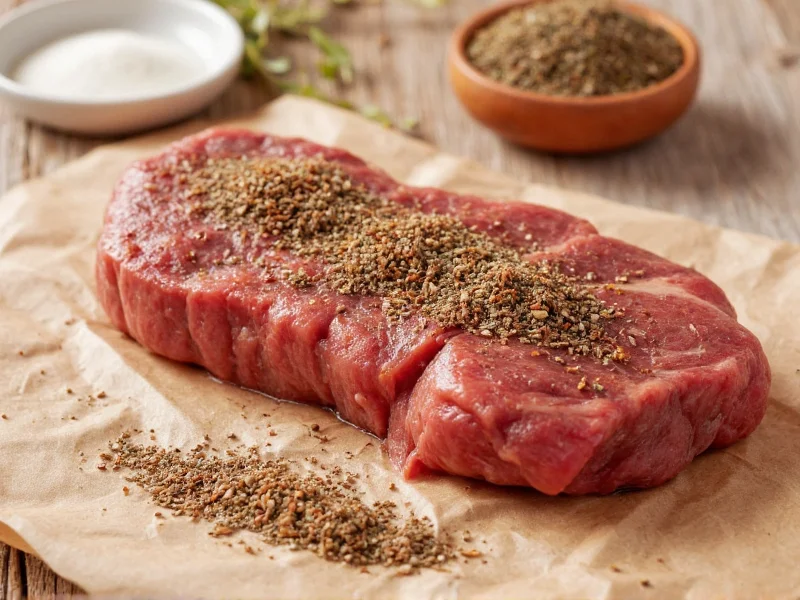The perfect homemade steak seasoning requires just five pantry staples: 2 tablespoons coarse salt, 1 tablespoon freshly ground black pepper, 1 tablespoon garlic powder, 1 tablespoon onion powder, and 2 teaspoons smoked paprika. This simple blend creates restaurant-quality flavor without additives or preservatives, costing pennies per batch compared to store-bought alternatives.
Creating your own steak seasoning unlocks superior flavor control while avoiding the unnecessary fillers and anti-caking agents found in commercial blends. This easy homemade steak seasoning recipe delivers consistent results whether you're grilling, pan-searing, or broiling your favorite cuts. The beauty of making steak seasoning from scratch lies in its complete customization - adjust ingredient ratios to match your personal taste preferences or specific cooking methods.
Why Homemade Steak Seasoning Outperforms Store-Bought
Commercial steak seasonings often contain unnecessary additives like maltodextrin, silicon dioxide, and excessive sodium levels. When you make your own steak rub for grilling or pan-searing, you control exactly what goes on your meat. This healthy steak seasoning alternative eliminates hidden sugars and artificial ingredients while providing fresher, more vibrant flavors. Plus, the cost savings are substantial - a batch costs approximately $0.25 compared to $3-$5 for specialty store blends.
Essential Steak Seasoning Ingredients Explained
Understanding each component's role helps you create the best steak seasoning ingredients for your specific needs:
| Ingredient | Flavor Contribution | Recommended Quantity |
|---|---|---|
| Coarse Salt | Enhances natural meat flavors, aids crust formation | 2 tablespoons per pound of steak |
| Freshly Ground Black Pepper | Provides heat and complexity | 1 tablespoon per pound of steak |
| Garlic Powder | Deep savory notes without burning | 1 tablespoon per pound of steak |
| Onion Powder | Sweetness and umami foundation | 1 tablespoon per pound of steak |
| Smoked Paprika | Subtle smokiness and color | 2 teaspoons per pound of steak |
Customizing Your Steak Seasoning Blend
Once you've mastered the basic homemade steak seasoning recipe, experiment with these variations for different flavor profiles:
- Southwest Style: Add 1 teaspoon cumin and ½ teaspoon chili powder for a Tex-Mex twist
- Herb-Infused: Mix in 2 teaspoons dried rosemary and thyme for an elegant touch
- Spicy Kick: Incorporate ½ teaspoon cayenne pepper for heat lovers
- Sweet & Smoky: Blend in 1 teaspoon brown sugar for caramelization
Step-by-Step Preparation Guide
Follow these simple steps for perfect homemade steak seasoning every time:
- Measure all dry ingredients using proper measuring spoons (not tableware)
- Combine in a small bowl, breaking up any clumps with a fork
- Mix thoroughly for 60 seconds to ensure even distribution
- Transfer to an airtight container immediately
- Label with date and ingredients for future reference
Proper Storage for Maximum Freshness
Store your homemade steak rub in an airtight glass container away from heat and light. Properly stored, it maintains peak flavor for 3-4 months. Avoid plastic containers which can absorb odors and affect taste. For extended shelf life, keep in the refrigerator - especially if including sugar-based ingredients. Never store near your stove or oven where temperature fluctuations degrade quality.
Application Techniques for Perfect Results
How much seasoning per pound of steak matters for optimal flavor. Use this professional technique:
- Pat steaks completely dry with paper towels before seasoning
- Apply 1½ teaspoons of seasoning per side for 1-inch thick cuts
- Gently press seasoning into the meat surface
- Allow 40-60 minutes at room temperature before cooking
- For thicker cuts (1½+ inches), increase seasoning time to 90 minutes
Troubleshooting Common Issues
Encountering problems with your homemade steak seasoning? Try these solutions:
- Seasoning burns during cooking: Reduce paprika content or lower cooking temperature
- Flavor too salty: Decrease salt by 25% and increase other ingredients proportionally
- Not enough crust formation: Ensure meat surface is completely dry before seasoning
- Flavors not penetrating: Extend resting time before cooking to 90 minutes
Expert Tips for Culinary Excellence
Professional chefs recommend these advanced techniques for the ultimate steak experience:
- Toast whole peppercorns before grinding for deeper flavor complexity
- Add ½ teaspoon mustard powder to enhance browning reactions
- For dry-aged steak, reduce salt content by 20% to account for natural concentration
- Combine seasoning with 1 teaspoon olive oil to create a paste for better adhesion
How long does homemade steak seasoning last?
Properly stored in an airtight container away from heat and light, homemade steak seasoning maintains optimal flavor for 3-4 months. For best results, write the preparation date on the container. While not unsafe after this period, the volatile oils in spices gradually diminish, reducing flavor intensity.
Can I use fresh garlic instead of garlic powder in steak seasoning?
Fresh garlic burns easily at high cooking temperatures, creating bitter flavors. Garlic powder provides consistent, controlled flavor without burning. If you prefer fresh garlic, rub whole cloves directly on cooked steak rather than incorporating into the dry rub.
Should I salt steak before or after applying seasoning?
Salt is part of the seasoning blend - they should be applied simultaneously. The complete seasoning mixture works synergistically. Apply your homemade steak seasoning 40-60 minutes before cooking to allow salt to penetrate while drawing out surface moisture for better searing.
What's the ideal ratio of seasoning to steak?
Use approximately 1½ teaspoons of seasoning per side for a standard 1-inch thick steak. Thicker cuts (1½ inches or more) benefit from 2 teaspoons per side. Remember that proper application technique - gently pressing the seasoning into the meat surface - matters as much as quantity for flavor penetration.











 浙公网安备
33010002000092号
浙公网安备
33010002000092号 浙B2-20120091-4
浙B2-20120091-4